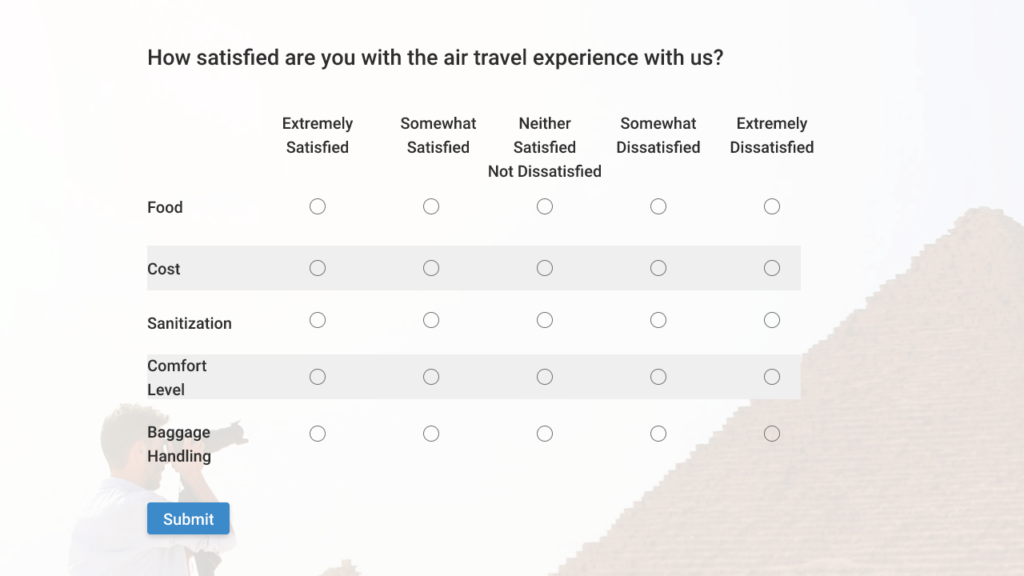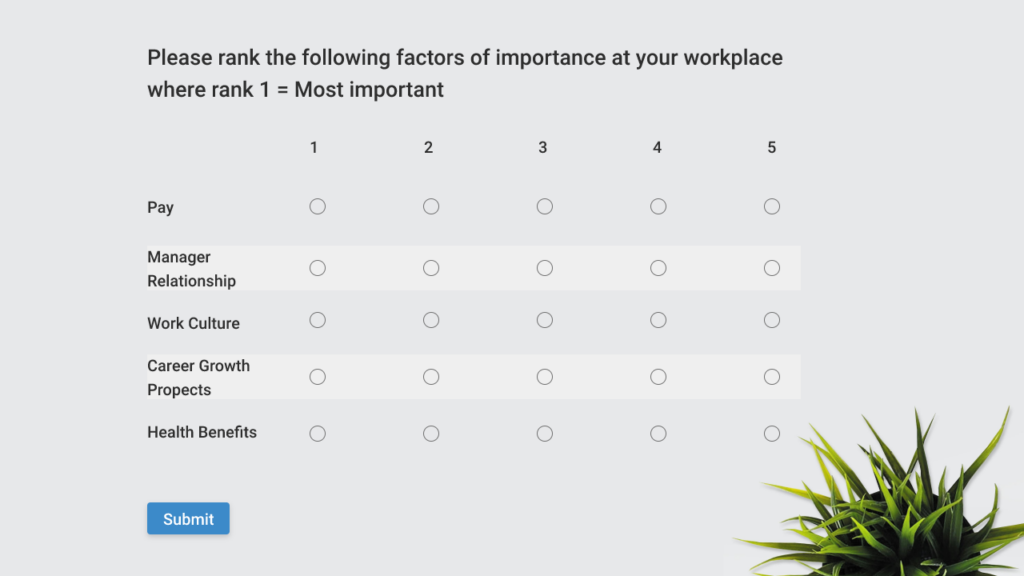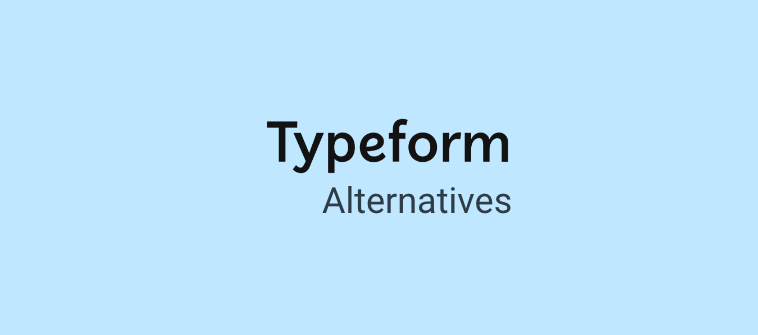
Ever noticed why some surveys get overwhelming responses with high participation and detailed answers, while others barely receive any attention?
Well, the secret to a successful survey lies in crafting the right questions.
A successful survey balances straightforward, closed-ended questions with more expansive, open-ended ones. The former allows for quick and easy responses, while the latter invites detailed feedback, offering deeper insights.
The overall length of the survey and the timing of its distribution also play significant roles in effectively engaging your audience.
If you aim to design surveys that receive high response rates, this blog is tailor-made for you.
But first, let’s watch a quick video on how to create a survey.
Watch: How to Create a Survey Using ProProfs Survey Maker
Types of Survey Questions
Common survey questions can be broadly divided into open-ended and closed-ended questions. While open-ended questions help you collect qualitative data, with closed-ended questions, you can collect quantitative feedback.
Let’s explore these in detail:
1. Open-Ended Questions
These types of questions collect detailed information from your target audience in the form of text answers. Open-ended questions are most utilized in cases where your customers have a concern beyond what’s available in the predefined answer options.
By analyzing their word choice, language, and tone of answers, you can understand the emotions that customers go through while using your products or services. In crucial areas like customer support, you need more than just a yes/no answer from your respondents, and open-ended questions add that depth to the feedback you collect.
Example: “How is your experience of using our products?”
2. Close-ended Questions
Closed-ended questions require the respondent to choose from a given set of responses, limiting answers to those options. This makes the data easy to quantify, allowing for straightforward analysis and comparison. Closed-ended questions are efficient for surveys with a large number of respondents, as they ensure consistency in responses and facilitate automated data processing.
Example: “Do you own a smartphone? (Yes/No)”
3. Rating Scale
Rating scale questions ask respondents to evaluate a statement or question based on a given scale, such as 1 to 5 or 1 to 10, where each point on the scale represents a different level of intensity or frequency. This format is useful in customer satisfaction survey and for measuring attitudes, opinions, or behaviors, providing a quantifiable measure of subjective phenomena.
It allows researchers to assess degrees of agreement or satisfaction, making it easier to identify trends and patterns.
Example: “How likely are you to recommend our service to a friend or colleague on a scale of 0 (not likely) to 10 (extremely likely)?”

Demographic Survey Questions
Demographic survey questions seek to collect specific data about the respondent’s background, including age, gender, income, education, employment status, and more. This information is crucial for segmenting the survey population and analyzing responses based on demographic factors.
It helps in understanding how different groups perceive and interact with a product, service, or topic, enabling targeted insights and decision-making.
Example: “What is your highest level of education completed?
- Some high school
- High school graduate
- Some college
- Bachelor’s degree
- Graduate degree
5. Multiple Choice Questions
Multiple choice questions offer respondents a list of possible answers, from which they select the one that most closely aligns with their opinion or experience. This type is versatile and can be used to gather data on preferences, behaviors, or factual information.
Multiple-choice questions simplify the analysis process by standardizing responses, but they require careful consideration to ensure all potential answers are represented.
Example: “Which of the following categories best describes your employment status?
- Employed full-time
- Employed part-time
- Self-employed
- Unemployed, Student
- Retired
6. Drop Down
Drop-down questions are a variant of multiple-choice questions that save space and help keep surveys looking clean and uncluttered. They are particularly useful when presenting a long list of options, such as countries or states. This format can improve the respondents’ experience by making it easier for them to navigate the survey.
Example: “Select your industry from the dropdown list: [List of industries]”
7. Grid of Choice
Also known as matrix questions, a grid of choice questions allows respondents to evaluate multiple items using the same set of response options presented in a grid format. This is efficient for collecting data on a series of statements, making it easy to compare responses across different items. However, make sure to use them sparingly to avoid overwhelming respondents.
Example: “Please rate the following aspects of our product on a scale from 1 (Very Unsatisfied) to 5 (Very Satisfied): Quality, Price, Customer Service, Durability.”

8. NPS Scale
The Net Promoter Score (NPS) is a specialized rating scale that measures customer loyalty and the likelihood of referrals. It is a powerful tool for gauging customer satisfaction and predicting business growth. The simplicity of the NPS question format facilitates quick and easy assessment of customer sentiment towards a company, product, or service.
Example: “On a scale of 0-10, how likely are you to recommend our company to friends or colleagues?”
9. Upload
Upload questions enable respondents to provide additional context to their answers through the upload of files or images. This can be particularly useful for gathering evidence in customer service inquiries, collecting creative submissions, or obtaining documentation. It adds a layer of depth to the data collected, allowing for more nuanced analysis.
Example: “Please upload a copy of your receipt or proof of purchase.”
10. Nominal Questions
Nominal questions categorize data into non-ordinal categories, meaning there is no inherent order to the options. They are used to label variables into distinct, separate groups without implying any hierarchy or quantity. This type is key for classifying respondents and can be pivotal in analyzing behavioral patterns across different segments.
Example: “Which of the following best describes your current role? (Manager, Technician, Salesperson, Administrative, Other)”
11. Likert Scale Questions
Likert scale questions are designed to capture the intensity of a respondent’s feeling towards a statement, typically ranging from strong agreement to strong disagreement. They are widely used in surveys to measure attitudes, opinions, and people’s perceptions.
Usually, the Likert scale makes use of levels (1-7), (1-5), or (1-3), where the lower levels (‘1’) are indicative of low or negative sentiments while higher levels (‘7’, ‘5’, ‘3’) are indicative of higher or positive feelings. The midpoint of the scale indicates neutral views of survey takers.
Likert scales are valuable for understanding nuances in responses and are effective for measuring changes in perceptions over time.
Example: “I believe that the customer service I received was satisfactory. (Strongly Disagree, Disagree, Neutral, Agree, Strongly Agree)”
12. ‘Yes’ or ‘No’ Questions
‘Yes’ or ‘No’ questions are the simplest form of survey questions, offering respondents a binary choice. While they may not provide deep insights, they are effective for qualifying respondents or obtaining clear, decisive answers to specific questions. They can serve as gateways to more detailed questions based on the response given.
Example: “Have you used our online customer service portal? (Yes/No)”
13. Data Reference
Data reference questions ask respondents to consider specific data, experiences, or content before answering. This type encourages respondents to reflect on particular aspects of their interaction with a product or service, providing more targeted insights.
Example: “Based on the last product update, how would you rate the improvement in user experience? (Significantly improved, Somewhat improved, No change, Somewhat worsened, Significantly worsened)”
14. Miscellaneous Questions
Miscellaneous questions encompass any question type that doesn’t fit into the other categories but is necessary for achieving the survey’s objectives. They can be creatively used to gather unique insights or to add an engaging element to the survey.
Example: “If you could suggest one new feature for our app, what would it be?”
250+ Survey Questions That You Can Use
Now that we know about the different types of survey questions, it is time to delve into survey question examples categorized based on different business strategies.
1. Customer Survey Questions
Customer surveys are used to gather insights from the customer about the product, service, and the whole sales process in general. Customer survey questions are tricky as it is often difficult to identify what exactly you want from the customers. In this section, we have covered sample survey questions for customer satisfaction and customer feedback. You can use these survey questions as examples or frame your questions in a similar way.
1.1 Customer Satisfaction Survey Questions Examples
Customer satisfaction survey questions are centered around how satisfied the customer is with the product and the company. You can frame the standard customer satisfaction survey questions for your feedback forms using these sample customer satisfaction survey questions.
- How satisfied were you with the way our operator handled your problem?
- Was your issue resolved promptly?
- Were you able to locate products/services/information without assistance?
- Are you happy with your shipping options?
- Did the product arrive on time?
- Did the product meet your expectations?
- Does our product offer value for money? Please rate.
- What made you choose us over the competition?
- Would you recommend our products or services? Why or why not?
- If you could change one thing about our product or service, what would it be?
1.2 Customer Feedback Survey Questions Examples
Customer feedback surveys are targeted towards the most recent transaction a customer has with the brand. Take a look at how your customer service survey questions should ideally be framed.
- Did we meet your expectations?
- How would you rate your interaction with our employees?
- Did you have any difficulties finding the product you were looking for?
- Did you find the sales process too long or tiring?
- What can we do to make future transactions easier?
- Did you feel comfortable shopping with us?
- What products or services do you wish we carried?
- How could we have exceeded your expectations?
- Is there anything else you would like to tell us regarding your experience?
- Have you used or visited our website?
- Was the website easy to use?
- What would you change about our website?
- What were you using before you found us?
- What did you like about the previous product/service(s)?
- What caused you to leave?
- What does our business do better?
- Is there anything you miss about the previous product/service(s)?
- What problem were you trying to solve when you initially came across our product or service?
Read More: Best Online Survey Tools & Software
2. Human Resource Survey Questions
Human resource survey question examples primarily deal with questions related to employee engagement, satisfaction, and training & development. Use these sample employee survey questions as a base for your employee survey questions.
2.1 Employee Engagement Survey Questions Examples
Employee engagement survey questions are aimed at identifying the level of involvement an employee has within the organization. You can frame your employee engagement survey around the following questions.
- What would you like to change about your job/workplace?
- What’s your favorite thing about your job/workplace?
- What is the company’s greatest weakness?
- What is the company’s greatest strength?
- Do you see your career developing in this company?
- How challenging or exciting do you find your work to be?
- Do you feel valued by your manager?
- Do you trust other members of your team?
- Do you have all the resources you need to do your job well?
- Do you feel that your contribution is recognized?
- Would you recommend your friends to work here?
- Do you have a clear understanding of your career or promotion path?
- How would you rate your work-life balance?
- Hypothetically, if you were to quit tomorrow, what would your reason be?
- If you were given the chance, would you reapply to your current job?
2.2 Employee Evaluation Survey Questions Examples
Employee evaluation surveys are aimed at identifying an employee’s strengths and weaknesses. Given below are examples of survey questions for your employee evaluation survey.
- What accomplishments on this job are you most proud of?
- Which goals did you meet? Which goals fell short?
- What motivates you to get your job done?
- What can we do to make your job more enjoyable?
- In what conditions are you most productive?
- What personal strengths do you have that help you do your job effectively?
- What makes you the best fit for your position?
- What skills do you have that you think could be used more effectively within the company?
- What kind of work comes easiest to you?
- What 2-3 things will you focus on in the future to help you grow and develop?
- How can the company help you better meet your goals?
- Which job responsibilities/tasks do you enjoy most?
- Which roles do you least enjoy?
- How do you think your role helps the company succeed?
- What do you like least about your current role? What would you change?
- What do you like most about working for this company?
- What are your most important goals for the next quarter?
- What do you want your next position at this company to be? How would your responsibilities change?
- What professional growth opportunities would you like to explore in order to get there?
- What type of career growth is most important to you?
- How do you prefer to receive feedback and/or recognition for your work?
- What can we do to improve our manager-employee relationship?
2.3 Job Satisfaction Survey Questions Examples
Job satisfaction surveys, also known as employee satisfaction surveys, are used to gauge the morale of employees. Employee satisfaction survey questions need to be framed around how the employee feels regarding the job and workplace environment.
- Is there a clear understanding of the goals set by the organization?
- Are you clear on what your role demands in meeting the company objectives?
- Do you believe there is an opportunity for individual growth and development within the company?
- Do you see yourself working for the same organization in the next 2 years?
- Are you satisfied with your job overall?
- How would you rate the team culture?
- Does your team provide you support at work whenever needed?
- If something unusual comes up, do you know who to go to for a solution?
- Do you have all the resources and tools you need to perform your duties well?
- Do your seniors/managers encourage you to do your best?
- Do you feel you are rewarded for your dedication and commitment towards the work?
- Do you feel that your superiors value your opinions?
- Do you feel there is a scope for personal growth such as skill enhancement?
- Does the management involve you while taking leadership related decisions?
- Do you think you are valued by your manager?
- Do you think you go beyond your limits to fulfill a task?
- Do you think you have had enough training to solve customer issues?
- Do you think your personal time is respected by the management?
- Do you think the environment here helps you maintain a work-life balance?
- Does your job cause unreasonable stress to you?
- Do you think the organization has fair policies for promotion for all employees?
- Do you find your job meaningful?
2.4 Survey Question for Training Feedback
Training survey questions are focused on employee training and development activities. The ideal questions to use in training surveys are shown below.
2.5 Pre-Training Survey Questions
- What do you expect from this training session?
- Do you think this training session will help you?
- Do you have any expectations regarding the outcome of this training program?
- Are you nervous about taking up this training program?
- Are you looking forward to this training?
- Were you informed beforehand about the specifics of the training session?
- Did you get an itinerary for the session?
- Do you know what the training session will cover?
- Are the timings of the training session convenient to you?
- How likely are you to recommend this session to your friends/family?
2.6 Post-Training Survey Questions
- Did the training session meet your expectations?
- Did you enjoy the training session?
- Did you learn something new?
- Was the training session implemented as you had hoped?
- How can we improve the training session further?
- Were the objectives of the training well defined?
- Was participation and interaction encouraged?
- Were the topics covered relevant to you?
- Was the training material well organized and easy to follow?
- How useful was the training material or session to you?
3. Market Research Survey Questions
Market research is important when companies venture into new markets or are about to launch a new product or service. Market research survey questions include questions on demographics, previous buying behavior, and future expectations.
3.1 Demographic Research Questions
Demographic research questions aim to find out more about the lives of the intended audience. However, try not to include too many questions about demographics and other sensitive information, as the information revealed may get too personal.
- What is your age?
- What is your gender?
- What is your education level?
- Where do you live?
- What is your profession?
- What is your household size?
- What are your biggest challenges?
- What are your primary goals?
- What is most important to you?
- Where do you go for information?
- How do you like to make purchases?
- How likely are you to recommend our brand to a friend?
- How long have you been a customer?
- What problems do we solve for you?
- How does our product/service fit into your daily workflow?
- How well does our product/service meet your needs?
- What do you wish the product/service had that it currently does not?
- What do you like most/least about our product/service?
- What made you choose us over our competitors?
- How would you rate your last experience with us?
- How did you find us?
3.2 Questions for Competitor Analysis
These questions focus on collecting data about competitors’ products, services, customer satisfaction levels, marketing strategies, and market positioning. The aim is to identify strengths and weaknesses in competitors’ offerings and strategies, as well as to uncover opportunities and threats in the market.
- How is our brand doing compared to our competitors?
- How do our competitors effectively attract customers?
- How much website traffic do your competitors receive?
- Which keywords are driving traffic to your competitors?
- Which sources are driving traffic to your competitors?
- How many inbound links do your competitors have?
- What type of content is performing well for your competitors?
4. Education Survey Questions
Education surveys are equally important for teachers and students. Collecting feedback from students and teachers can help improve the school curriculum and environment. Check out the sample questions for student and education surveys below.
4.1 Survey Question Examples for Students
Survey questions for students are centered around the students’ workload and its effect on the mind of a student.
- How often does schoolwork keep you from getting enough sleep?
- How often do you worry about school assignments?
- Do you worry about getting into the college of your choice?
- How many hours a day do you spend on homework?
- Does the assigned homework help you learn the material?
- How many hours a week do you spend participating in extracurricular activities?
- What is the main reason you participate in extracurricular activities?
- How much sleep do you typically get on a weeknight? On weekends?
- Where do you typically keep your phone when you go to sleep at night?
- To what extent are you confident in your ability to cope with stress?
- In the past month, how often have you experienced exhaustion, difficulty sleeping, or headaches?
- How often do you try as hard as you can in school?
- How often do you enjoy your schoolwork?
- How often do you find your schoolwork valuable?
- Do your teachers value and listen to students’ ideas?
- Do your teachers treat students with respect?
- Do you feel like you belong at this school?
- Do you feel that other students at this school accept you for who you are?
- How important is it to your parents/guardians that your schoolwork challenges you to think?
- How much do your parents/guardians worry about you getting a bad grade in school?
4.2 Teacher Survey Questions Examples
Survey questions for teachers should always center around the curriculum and the relationship of the teacher with the administration. The best survey questions for teachers are shown below.
- Does the school administration care about you as an individual?
- How fairly does the school leadership treat the staff?
- At your school, how valuable are the available professional development opportunities?
- Do you get inputs for your professional development opportunities?
- How often do your school’s facilities need repairs?
- How important is it for your school to hire more specialists to help students?
- How respectful are the relationships between staff and students?
- To what extent are you trusted to work in the way the administration thinks is the best?
- At your school, how objectively is your performance assessed?
- How effective is your school’s evaluation system at helping you improve?
- Does the school staff collectively brainstorm to provide better learning experiences?
- Does the school staff put in extra effort for students with disabilities?
- Were you consulted before finalizing the curriculum for the students?
5. Event Survey Questions
Conducting an event survey is crucial for knowing about your audience’s expectations. Also, a post-event survey lets you know if you have addressed their challenges effectively.
Event survey questions can be broadly classified into:
- Pre-event survey questions
- Mid-event survey questions
- Post-event survey questions
5.1 Pre-event Survey Questions Examples
Pre-event survey questions are set with the future arrangements you intend to make for your event in mind.
- How did you hear about the event?
- When are you arriving?
- Which social platform do you prefer?
- How do you feel about the location of the event?
- What are you hoping to get out of the event?
- Have you attended this event before?
- What speakers are you looking forward to most?
- Is there any event information that you couldn’t find or access easily?
- Do you have any special needs or disabilities that we can help accommodate?
- Do you have any food allergies or specific dietary needs?
5.2 Post-event Survey Questions Examples
Frame your post-event survey questions around the insights you require from your attendees regarding the organization, facilities, and recommendations for future events.
- How satisfied were you with the event?
- What did you like most about the event?
- What did you like least about the event?
- How likely are you to attend one of our events in the future?
- How likely are you to recommend our events to a friend?
- In your opinion, did the event meet the objectives it set in the beginning?
- Which topics/activities would you like to see covered at future conferences/events?
- Was the event staff friendly?
- Did you get all the information regarding the event beforehand?
- Was the event too long, too short, or just rightly timed?
6. Healthcare Survey Questions
Healthcare surveys mainly include questions about patient satisfaction, hospital employee surveys, and other surveys regarding confidential patient information. We’ve covered the ideal questions to ask in a patient satisfaction survey below.
- How can we improve our services?
- Was it easy to make an appointment?
- Were you pleased with the check-in process?
- Were you pleased with the check-out process?
- Were you attended to in a timely manner?
- How do you rate the staff that worked to care for you?
- How much concern did the care provider show for your questions or worries?
- During your most recent visit, did this care provider listen carefully to you?
- Rate the friendliness/courtesy of the care provider.
- Would you recommend our hospital to a family member or friend?
- Are you currently covered under a health insurance plan?
- How often did you receive conflicting information from different medical care professionals at this hospital?
- How satisfied were you with the medical and other facilities available to you?
- Did the hospital staff follow adequate medical safety procedures during the treatment process?
7. Brand Awareness Survey Questions
Understanding how “aware” your audience is regarding your brand is a crucial step in learning whether you were able to reach out to them successfully. That’s exactly what brand awareness survey questions aim to achieve. Most commonly seen on social media, a few brand awareness survey questions include:
- Did you see an ad for this product/service recently?
- Have you ever used any product from <product brand> before?
- Do you remember seeing an ad for <brand name> in the past week?
- Which word would you use to define this brand?
- Would you recommend this brand to your friends or family?
- How likely are you to recommend this brand to your friends or family?
- Have you always been satisfied with this brand’s products?
- Will you ever return to this brand again?
- Were the products available as per your quality standards?
- Which brand do you remember seeing an ad for this past week?
8. Website Feedback Survey Questions
Creating a good customer experience is crucial, but so is ensuring a smooth user experience. The only way you can achieve this is by asking customers how they like your website and how you can improve upon it further. That’s what website feedback survey does. A few questions you can ask in such surveys include:
- Were you able to navigate through our website easily?
- Did you find all the important information on the website?
- Would you like to see any changes in the website design?
- Does the website meet your expectations?
- Did it take a lot of time for you to find what you were looking for on the website?
- Is our website visually appealing?
- Is our website properly optimized for your device?
- Do you trust the information available on our website?
- Is the information easily visible on our website?
- How likely are you to recommend this website to a friend/colleague?
9. Sales Survey Questions
The most common survey question type is probably the sales survey questions. Post-sales, every customer is asked to undergo a quick survey. This way, companies get insight into whether their customers are happy with their purchase process, products, and services. The two main instances wherein companies ask for customer feedback and the sales survey questions that are asked include:
9.1 Post-Sales Questions
- Was the product reasonably priced?
- Did you find it difficult to find the product you liked?
- Was it easy to go through with the purchase?
- Is there any way we can improve the overall buying experience?
- If we can, please tell us how you’d like us to change.
9.2 Post-Delivery Questions
- Did you receive the same product you placed an order for?
- Is the quality as per your standards?
- Does the product look exactly like the images shown online?
- Is the product worth the price mentioned on the app?
- Will you buy a product from us again?
10. Transport Survey Questions
Carpooling, taking a cab, booking a bus or train ticket, and taking a flight to your destination have become really common among people nowadays. With a rise in demand, numerous companies are offering this service. In this case, companies ask customers to ask survey questions after the customers reach their destination. A few examples of such questions are:
- Was your trip comfortable?
- Were the seats allocated to you available at the time?
- Were the seats clean?
- Did you have any difficulty boarding or finding the bus/cab?
- Was the bus/cab driver polite?
- Did the flight attendants cater to your needs?
- Did the flight attendants give you the basic safety information?
- Was the food served during your journey of good quality?
- How would you rate your journey on a scale of 1 to 10?
- Will you travel with us again?
11. Lead Generation Survey Questions
Capturing leads and converting them into potential customers is crucial to keep your business booming. Not only that, but lead generation also helps you generate brand awareness and build a brand image among your target audience. A few lead generation questions you can add in your survey include:
- Are you looking to buy something online in the next quarter?
- Have you heard of <this brand>?
- Are you solely responsible for your company’s budget?
- Are you planning to save money?
- How often do you order food online?
- Have you ever bought clothes online?
- When was the last time you bought something?
- What’s the most common thing you bought online?
- How do you decide on a brand when finalizing a product?
- What would matter more to you: price or quality?
12. Non-Profit Survey Questions
Non-profit organizations cover a large network of donors, volunteers, and other staff. Surveys for non-profit organizations can cover fundraising events, volunteer feedback, and so on. Good examples of survey questions for nonprofits are shown below.
Volunteer Feedback Survey Questions Examples
- How much of an impact do you feel your work here has had?
- How convenient were the volunteer training sessions?
- Did you find the volunteer training sessions to be helpful?
- How easy was it to get along with other volunteers?
- Did you find the staff easy to get along with?
- Do you feel appreciated by your supervisor?
- How satisfied or dissatisfied are you with your association with our organization?
- How likely are you to continue volunteering for our organization?
- How many hours a month do you spend volunteering?
- How likely are you to recommend this organization to a friend or colleague?
Survey Questions: Do’s and Don’ts
The best survey questions are short and precise, avoid jargon, and prompt the respondent to take up a survey with ease.
Let’s understand the tips and tricks to create survey questions:
- Frame the questions from the perspective of the customers by keeping their needs first. You must use empathetic language to address their pain points.
- Use simple and jargon-free language in your survey. Else, your respondents may get confused and drop out of the survey.
- Avoid leading questions that can sound biased and give your respondents a desirable answer.
- Start your survey with simple close-ended dichotomous questions. This will encourage your respondents to continue attempting your survey questions.
- Use a balanced mix of both open-ended and close-ended questions.
- Preferably use the first-person perspective while framing questions. The survey takers feel more connected with such personalized questions.
Use Surveys the Right Way to Enhance Your Brand Image
Survey questions play a crucial role in gathering valuable data and insights that can inform decision-making and strategy development across various fields.
Ultimately, you have to thoroughly understand the different types of survey questions and how to employ them effectively to design surveys that not only engage respondents but also yield meaningful and actionable data.
Whether you’re conducting market research, evaluating customer satisfaction, or exploring new trends, the knowledge of survey question types and their applications will increase your ability to gather reliable information and make well-informed decisions that drive success.
Make sure your surveys have versatile question types like multiple-choice questions (MCQs), rating scale and ranking scale questions, open-ended questions, etc., so that the data you collect is well-rounded, nuanced, and in-depth.
Also, use simple and jargon-free language so that your survey audience can complete your survey without confusion.
For online surveys, you can use popular survey software like ProProfs Survey Maker to get started. Use the available customizable templates and share them on multiple platforms like email, social media, website embedding, and more.
Learn More About Survey Questions
How to write survey questions?
To write survey questions, ensure they are clear, concise, and free from bias. Begin with a clear objective, use straightforward language, and make sure each question is relevant to the participants.
What is a bad survey?
A bad survey is characterized by leading questions, unnecessary complexity, lack of focus, or relevance to its goals, which results in poor-quality data.
How do you ask someone to answer your survey?
You can ask someone to answer your survey by politely requesting their participation, explaining the significance of the survey, and emphasizing how their feedback will contribute to meaningful insights or improvements.
How do you convince a customer to fill out a survey?
To convince a customer to fill out a survey, offer incentives, highlight the survey’s quick completion time, emphasize the impact of their feedback on improving their future experiences, and ensure the survey is easy to access.
How to analyze all of the questions and answers?
To analyze all of the questions and answers, systematically organize the collected data, utilize statistical tools or software for analyzing quantitative responses, and apply thematic analysis for qualitative responses to identify patterns, trends, and key themes. You can also use a survey software like ProProfs Survey Maker to make the process automated and easy.
Do you want a free Survey Software?
We have the #1 Online Survey Maker Software to get actionable user insights.







